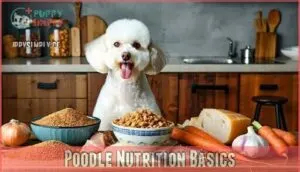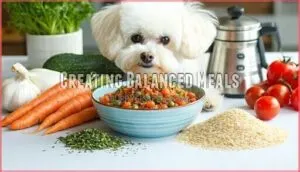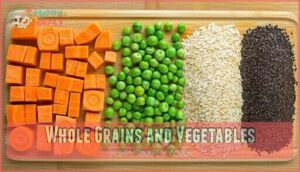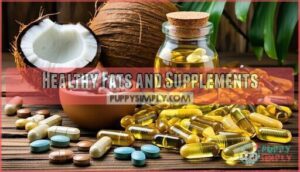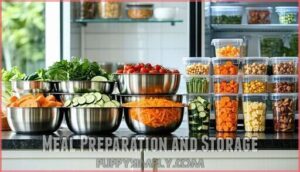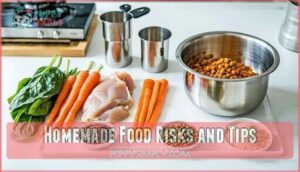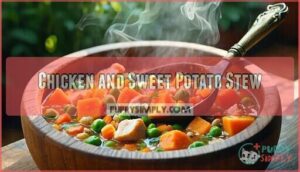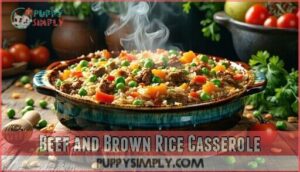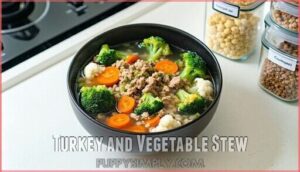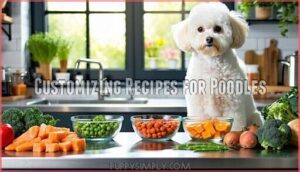This site is supported by our readers. We may earn a commission, at no cost to you, if you purchase through links.
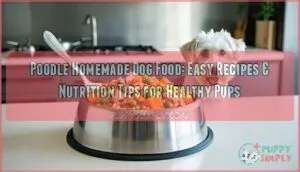
Your poodle needs balanced meals with high-quality protein (chicken, beef, fish), complex carbs (sweet potatoes, brown rice), and healthy fats.
Start with simple recipes combining lean meat, vegetables, and grains in proper ratios. Always switch gradually over 7-10 days to avoid digestive upset.
Avoid toxic foods like onions, garlic, and chocolate. While homemade meals offer transparency and customization for allergies or sensitivities, they require careful planning to meet nutritional requirements.
The secret lies in understanding portion sizes and which kitchen staples transform into tail-wagging masterpieces.
Table Of Contents
- Key Takeaways
- Poodle Nutrition Basics
- Homemade Food Benefits
- Creating Balanced Meals
- Homemade Food Risks and Tips
- Poodle Homemade Food Recipes
- Frequently Asked Questions (FAQs)
- What is a healthy homemade food for poodles?
- What is the best homemade food to feed a dog?
- What is the most important ingredient in homemade dog food?
- How often should poodles eat homemade food?
- Can puppies eat the same homemade recipes?
- What kitchen equipment is needed for preparation?
- How do I know if recipes are working?
- Should I rotate different protein sources regularly?
- Conclusion
Key Takeaways
- You’ll control every ingredient and cut food costs by up to 40% while ensuring your poodle gets fresh, preservative-free meals tailored to their specific health needs and allergies.
- Balance is crucial – aim for 18% protein and 5% fat for adult poodles, combining lean meats like chicken with complex carbs like sweet potatoes and healthy vegetables.
- Transition gradually over 7-10 days to prevent digestive upset, and always avoid toxic foods like onions, garlic, and chocolate that can seriously harm your poodle.
- Consult your vet first and monitor your poodle’s weight, coat condition, and energy levels to ensure the homemade diet is meeting all their nutritional requirements.
Poodle Nutrition Basics
Your poodle’s nutritional needs are unique, and understanding them helps you create meals that support their health, energy, and beautiful coat.
Getting the balance of protein, carbohydrates, fats, and vitamins right isn’t rocket science, but it does require some know-how to keep your curly-haired companion thriving.
Balanced Diet Importance
You’ll want to understand that proper nutrition forms the foundation of your poodle’s health, just like building blocks create a sturdy house.
Balanced meals prevent deficiencies while supporting ideal growth, energy levels, and immune function.
Essential components for poodle homemade dog food nutrition include:
- Nutrient Proportions – 18% protein, 5% fat for adults; 22% protein, 15% fat for puppies
- Calorie Needs – Standard poodles need 1,000-1,500 daily; toy/miniature need 200-600
- Supplement Variety – Vitamins and minerals to fill nutritional gaps
- Allergy Management – Controlled ingredients help identify and avoid triggers
- Diet Rotation – Different protein sources provide varied nutrients and reduce sensitivities
Protein Sources for Poodles
Your poodle’s protein needs are like building blocks for muscle health and energy.
Lean proteins such as chicken and beef provide complete amino acids, while novel proteins like duck help with allergy considerations.
Protein rotation prevents sensitivities and keeps meals interesting for your furry friend.
A raw diet can offer enhanced muscle definition due to its high protein content.
| Animal Proteins | Plant Proteins |
|---|---|
| Chicken (31g/100g) | Lentils (9g/100g) |
| Beef liver (20g/100g) | Chickpeas (8g/100g) |
| Salmon (omega-3s) | Tofu (hypoallergenic) |
| Eggs (complete amino acids) | Quinoa (gluten-free) |
Carbohydrates and Fiber Needs
Your poodle needs carbohydrates for steady energy, with complex options like brown rice and sweet potatoes beating simple sugars.
Complex carbs fuel your poodle’s day better than sugar rushes.
Aim for 20-30% carbs in their poodle homemade dog food. Fiber sources like pumpkin and green beans keep digestion smooth at 2-4% of total diet.
Whole grains offer better nutrition than refined versions, while grain alternatives like quinoa work for sensitive pups. Smart portion control prevents energy crashes.
Essential Fats and Vitamins
Essential fats fuel your poodle’s energy while vitamins keep their system running smoothly.
Without proper fat digestion and vitamin absorption, your furry friend might develop coat problems or energy dips that affect their daily joy.
Here are five key nutrients for ideal poodle nutrition:
- Omega-3 from salmon oil – Supports coat health and reduces inflammation
- Vitamin E from sunflower oil – Guards against oxidative stress
- B-complex vitamins – Essential for energy production and metabolism
- Fat-soluble vitamins A, D, K – Support vision, bones, and blood clotting
- Medium-chain triglycerides – Improve nutrient absorption in homemade dog food
Monitor supplement timing carefully – vitamins work best when paired with fats during meals. Regular blood testing helps identify vitamin deficiencies before they impact your poodle’s health. Quality omega sources in homemade poodle food make all the difference.
Homemade Food Benefits
When you make homemade food for your poodle, you’re taking control of exactly what goes into their bowl—no mystery ingredients or preservatives included.
This approach lets you customize meals for your dog’s specific needs while often saving money and boosting their overall health.
Fresh Ingredients and Transparency
Making homemade poodle food puts you in the driver’s seat regarding ingredient sourcing and quality control.
You’ll know exactly what goes into your pup’s bowl – fresh meat, vegetables, and natural ingredients without mystery additives or preservatives.
This transparency helps with allergy management and food sensitivities, letting you customize recipes based on your poodle’s specific needs while enjoying homemade dog food benefits.
Customization for Dietary Needs
Flexibility becomes your secret weapon when addressing poodle food allergies and sensitive stomach issues.
Recipe customization allows you to eliminate problematic ingredients while maintaining nutritional balance.
Age-specific diets accommodate growing puppies or senior dogs, while breed-specific needs guarantee your poodle’s unique requirements are met.
Individual portions help with weight management, and adjusting protein levels matches your dog’s activity level perfectly, which is crucial for weight management and overall health, considering the importance of nutritional balance.
Cost Savings and Convenience
You’ll pocket serious savings making homemade dog food—up to 40% less than premium kibble.
Bulk prepping weekly cuts costs by 30%, while ingredient sourcing from regular grocery stores beats specialty pet store markups.
Delivery services offer convenience, and freezing portions eliminates waste.
Your time investment pays off through cost-effectiveness and healthier homemade meals.
Improved Digestion and Health
Switching from processed kibble to homemade meals often transforms your poodle’s digestive health, supporting their gut microbiome with fresh, natural ingredients.
You’ll likely notice improved allergy management, immune boosting benefits, and better weight management.
Many owners report their poodle’s shiny coat and increased energy levels, proving that poodle nutrition guide recommendations for homemade dog food recipes truly enhance dog digestive health through quality poodle health diet choices.
A gradual change can help prevent common digestive problems, which is a crucial aspect of overall poodle nutrition.
Creating Balanced Meals
Creating balanced meals for your poodle isn’t rocket science, but it does require attention to proper proportions and quality ingredients.
You’ll need to combine high-quality proteins, wholesome carbohydrates, essential fats, and the right vitamins to keep your furry friend thriving with proper proportions.
High-Quality Protein Sources
Your poodle thrives on lean meats like chicken, turkey, and lamb as primary protein sources. Fish options including salmon and sardines provide omega-3 fatty acids for coat health.
- Poultry (chicken, turkey) – easily digestible muscle meat
- Fish (salmon, sardines) – rich in essential fatty acids
- Organ meats (liver, heart) – nutrient-dense additions
- Eggs – complete protein source
Rotate these proteins in recipes like chicken and sweet potato stew or beef and brown rice casserole for ideal protein variety.
Consider chicken based dog food for optimal canine health.
Whole Grains and Vegetables
Choosing the right whole grains and vegetables transforms your poodle’s meals from basic to brilliant.
Brown rice, oats, and quinoa provide steady energy while supporting digestive health.
Sweet potatoes, carrots, peas, and green beans deliver essential vitamins your pup craves.
| Whole Grains | Vegetables |
|---|---|
| Brown rice (easy digestion) | Sweet potatoes (vitamin A powerhouse) |
| Oats (fiber-rich comfort food) | Carrots (crunchy beta-carotene boost) |
| Quinoa (complete protein bonus) | Green beans (low-calorie crunch) |
Steam vegetables to preserve nutrients and avoid grain allergies by rotating ingredients.
Some owners prefer brown rice recipes for their dogs.
Proper cooking methods and portion control guarantee your recipes pack maximum nutrition without overwhelming tiny tummies.
Healthy Fats and Supplements
Beyond grains and vegetables, your poodle’s diet plan needs healthy fats and targeted supplements for ideal coat health and overall wellness.
Omega-3 benefits include reduced inflammation and joint support, while proper dosage guidelines prevent digestive upset. For guidance, consider researching the correct oil quantities for your dog’s size.
Key fat sources for your poodle feeding guide:
- Fish oils – Nordic Naturals provides EPA/DHA for cardiovascular health
- Coconut oil – Offers digestible MCTs, limit to 1 teaspoon per 10 lbs daily
- Sardines – Whole food omega-3s supporting coat condition, serve 1-2 times weekly
Supplement types like zinc and probiotics fill nutritional gaps in homemade meals, supporting poodle weight management and immune function.
Meal Preparation and Storage
Now that you’ve selected quality ingredients, proper meal preparation and storage keeps your poodle’s food fresh and safe.
Batch cooking saves time—prepare several meals at once, then portion into storage containers.
Freezing homemade food extends shelf life up to three months, while refrigerated portions last five days.
To guarantee your dog receives a balanced diet, consider adjusting nutrient ratios based on their specific needs.
| Preparation Method | Storage Duration | Food Safety Tips |
|---|---|---|
| Fresh batch cooking | 5 days refrigerated | Cool completely before storing |
| Freezing portions | 3 months frozen | Label containers with dates |
| Safe thawing | 24 hours in fridge | Never thaw at room temperature |
| Ingredient prep | Use within 2 days | Wash vegetables thoroughly |
| Storage containers | Airtight seal required | Clean containers between uses |
Homemade Food Risks and Tips
While homemade dog food offers many benefits for your poodle, you’ll need to navigate some important risks to keep your furry friend healthy.
Getting the nutrition right requires careful planning, and a few simple precautions can help you avoid common pitfalls that could harm your poodle’s health, ensuring the right approach to provide a healthy diet with complete concepts in mind.
Nutritional Balance and Consultation
Without professional guidance, nutritional balance becomes a guessing game that can harm your poodle’s health.
Recipe imbalance affects 60% of homemade dog food attempts, leading to dietary deficiencies in calcium and essential vitamins.
Vet consultation isn’t optional—it’s your safety net. A dog nutritionist guarantees puppy nutrition meets growth needs while senior diets address aging requirements, providing veterinary advice suited to your poodle’s specific life stage, ensuring proper nutrition.
Gradual Transition and Safety
Switching your poodle to homemade dog food for poodles requires patience and careful planning.
Your poodle’s health journey starts with one thoughtful meal at a time.
Rushing this diet switch can trigger digestive upset, turning mealtime into a stressful experience for both you and your furry friend.
- Week 1-2: Mix 25% homemade food with 75% current food, monitoring for any digestive upset
- Week 3-4: Increase to 50-50 ratio while ensuring safe storage of prepared meals in refrigerator
- Week 5-6: Complete diet change timeline with 75% homemade food, avoiding raw meat without veterinary guidance
Avoiding Toxic Ingredients
Never leave harmful ingredients lying around your kitchen when preparing homemade dog food for your poodle.
Chocolate toxicity, xylitol dangers, and grape concerns top the list of toxic ingredients to avoid completely.
Onion risks and harmful additives like artificial sweeteners can seriously harm your pet.
Always double-check recipes for dogfriendly ingredients and safe ingredients only.
Monitoring Health and Adjusting
After avoiding harmful foods, you’ll need to keep tabs on your poodle’s health indicators.
Watch their weight management closely – sudden gains or losses signal dietary adjustments are needed. Monitor coat condition, energy levels, and stool consistency weekly.
Look for allergy signs like itching or digestive upset. Regular blood panels help track your poodle diet plan’s effectiveness, ensuring proper dog health monitoring and diet monitoring for ideal health maintenance, including weight management.
Poodle Homemade Food Recipes
Now that you know what goes into healthy poodle meals, it’s time to put that knowledge to work with some tried-and-true recipes.
These three simple dishes will give your poodle the balanced nutrition they need while keeping meal prep manageable for busy pet parents.
Chicken and Sweet Potato Stew
With chicken as the star protein and sweet potato providing natural sweetness, this homemade dog food recipe creates a nutritious foundation for your poodle.
Combine diced cooked chicken, sweet potatoes, carrots, peas, and parsley with chicken broth.
Boil the ingredients, then simmer for 20-30 minutes until tender.
Always cool completely before serving to prevent burns—your poodle’s enthusiastic appetite can wait for safety, and this step ensures a healthy meal with chicken as the main ingredient.
Beef and Brown Rice Casserole
For busy pet parents, this hearty beef and brown rice casserole delivers complete nutrition in one dish.
Simply brown ground beef, then mix with cooked brown rice and vegetables before baking at 350°F for thirty minutes.
- Recipe Variations: Swap beef for lamb or add sweet potatoes for extra nutrients
- Ingredient Sourcing: Choose lean ground beef and organic brown rice from your local grocery store
- Storage Options: Freeze portions for up to three months or refrigerate for five days
Turkey and Vegetable Stew
This turkey and vegetable stew offers excellent stew variations for your poodle’s homemade dog food repertoire.
Focus on ingredient sourcing by selecting lean ground turkey and fresh vegetables like broccoli, carrots, and cauliflower.
Simple cooking methods work best—combine one pound ground turkey with six cups water, two cups brown rice, and frozen vegetables. Simmer for twenty-five minutes total.
Consider different serving suggestions based on your poodle’s size, and use proper storage solutions by refrigerating portions, which is an essential part of making homemade dog food.
Customizing Recipes for Poodles
Flexibility becomes your best friend when tailoring healthy poodle recipes to meet your dog’s unique needs.
Every poodle owner knows their furry companion has distinct preferences, and personalized nutrition plans help address everything from allergies to energy requirements through smart poodle food preparation.
Ensuring a balanced diet requires essential nutrients for dogs, including protein, carbs, and fats.
- Ingredient Swaps: Replace rice with quinoa for grain-sensitive poodles, or swap chicken for duck when allergy considerations demand novel proteins
- Life Stage Adaptations: Boost protein for growing puppies, reduce fat for seniors, and adjust portions based on your poodle’s activity level
- Taste Preferences: Add low-sodium broth or lightly sauté vegetables to make meals more appealing for picky eaters while maintaining proper poodle care standards
Frequently Asked Questions (FAQs)
What is a healthy homemade food for poodles?
You’ll create nutritious meals using lean protein like chicken or fish, plus brown rice and vegetables such as carrots and peas.
Always consult your vet for proper nutritional balance and portion sizes.
What is the best homemade food to feed a dog?
For most dogs, lean protein like chicken or turkey paired with sweet potatoes, brown rice, and vegetables creates nutritionally complete meals that support healthy digestion and energy.
What is the most important ingredient in homemade dog food?
When the rubber meets the road, high-quality protein stands as your most essential ingredient.
You’ll want lean meats like chicken, turkey, or fish to fuel your pup’s muscles and energy needs effectively.
How often should poodles eat homemade food?
You should feed your poodle homemade food once or twice daily, depending on their age, size, and activity level. Puppies typically need more frequent meals than adults.
Can puppies eat the same homemade recipes?
You can’t feed puppies the same recipes – they’re not one-size-fits-all.
Puppies need higher protein (22%) and fat (15%) than adults.
You’ll need to adjust portions and add calcium supplements for proper growth and development.
What kitchen equipment is needed for preparation?
You’ll need basic kitchen essentials: a large Dutch oven or stockpot for cooking, sharp knives for chopping, cutting boards, measuring cups, and storage containers for portioning meals.
How do I know if recipes are working?
Your poodle’s body becomes the ultimate report card, revealing everything you need to know!
Watch for steady weight, boundless energy, shiny coat, healthy stools, and enthusiastic mealtime excitement to confirm you’re nailing their nutrition.
Should I rotate different protein sources regularly?
Yes, rotating different protein sources regularly benefits your poodle’s health. Variety helps provide different nutrients, reduces allergy risk, and prevents picky eating habits from developing over time.
Conclusion
Transforming your kitchen into a poodle nutrition center isn’t just about following recipes—it’s about understanding your dog’s unique needs.
Preparing poodle homemade dog food requires careful attention to protein ratios, gradual phases, and avoiding toxic ingredients.
You’ll save money while ensuring fresh, quality meals customized to your poodle’s health requirements.
Consult your veterinarian before making dietary changes, monitor your dog’s response, and adjust portions as needed for superior results to ensure your dog’s health and well-being are optimized.

